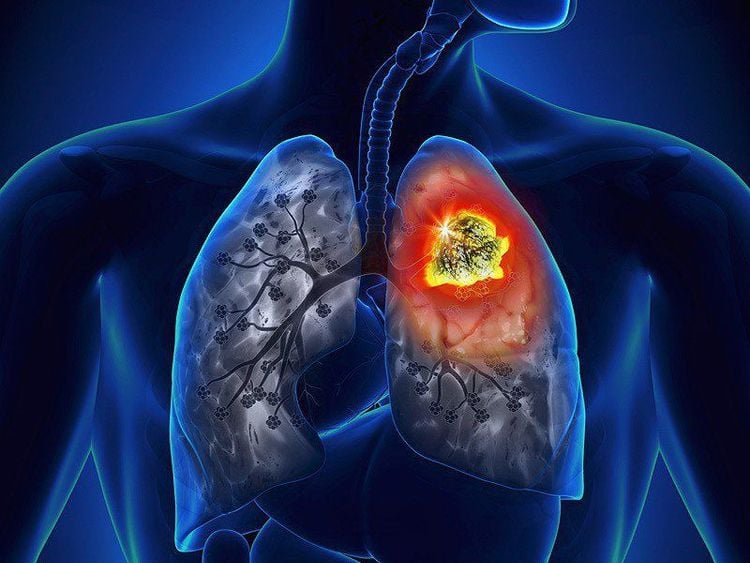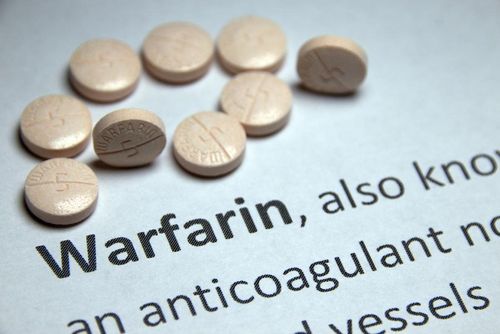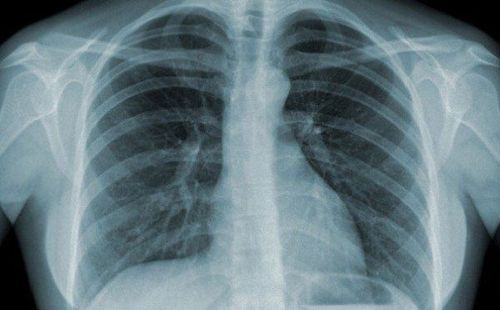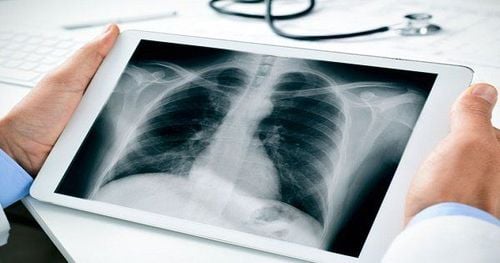This is an automatically translated article.
Lung cancer is a dangerous disease that does not cause obvious symptoms in the early stages. But if we pay close attention, we can recognize lung cancer at an earlier stage by the following symptoms.
1. Fingertips are fatter than usual
Some lung tumors produce hormone-like chemicals. One of these hormones pushes more blood and fluid to the fingertip tissues, so they look thicker or larger than usual. The skin next to the nail will now look shiny or the nail more curved than usual when viewed from the side.
This sign is uncommon, but changes in the fingers are strongly associated with lung cancer. It is estimated that about 80% of people with this manifestation also have the disease.
2. Lung cancer presents with abdominal problems One or two out of 10 people with cancer develop high blood calcium (hypercalcemia). Too much calcium in the blood can cause abdominal pain and make you nauseous or constipated, lose your appetite, and not feel thirsty. In addition, a substance similar to the hormone that the tumor produces will cause cramps and increase the feeling of nausea.

Ung thư phổi là bệnh nguy hiểm cần được điều trị sớm
3. Mental health issues In a Danish study, the rate of being diagnosed with small cell lung cancer was higher for people who had seen a mental health professional for the illness. such as anxiety disorders, depression and dementia. It could be because the cancer affects the immune system to some extent or metastasizes to the brain. In addition, when lung cancer signs of increased calcium levels can also cause confusion, confused thinking and the risk of depression.
4. Back or shoulder pain Pancoast's tumor is a type of lung cancer that develops in the upper part of the lungs and can spread to the ribs, certain vertebrae in the spine, nerves, and nerves. blood vessel. Because these tumors grow at the top of the lungs, they rarely affect the respiratory system. Instead, they are more likely to cause pain in areas like the shoulder blades, upper back, and arms.
5. Lung cancer signs of fatigue Lung cancer is a very common sign of low red blood cell count or anemia. Anemia can make you really feel tired, dizzy, dizzy, heart palpitations... Not only that, all cancer cells take away the nutrients they need to provide energy. our bodies throughout the day. That's why when you're sick, you can feel very tired.
6. Loss of balance Less common small cell lung cancer can cause your immune system to attack your own nervous system, which in turn can affect muscle function. Some symptoms may be encountered such as difficulty standing up when sitting or feeling unsteady, dizziness due to anemia.

Ung thư phổi biểu hiện nhiều triệu chứng khác nhau
7. Changes in body weight Some people with small cell lung cancer often have Cushing's syndrome. Cancer can stimulate your body to make a hormone called ACTH, which stimulates the adrenal cortex to produce hormones and increases cortisol levels. This results in the body retaining water and causing weight gain. Other symptoms may include very easy bruising and feeling drowsy.
On the other hand, hypercalcemia and SIADH (syndrome of abnormal secretion of antidiuretic hormone ADH), a hormone problem that affects the kidneys and tends to make the person feel anorexia, so you can Start losing weight without trying to eat.
8. Eye problems Pancoast tumors can also affect nerves to the eyes and part of the face, this is called Horner's syndrome. This syndrome causes parasympathetic nerve paralysis and symptoms include constriction of the pupil in one of the eyes, drooping of the eyelids on the same side, and inability to sweat on that side of the face.
Small cell lung cancer causes your immune system to turn against your optic nerve and it can cause a hard-to-see appearance.
9. Abnormally swollen breasts in men Lung cancer is a very rare symptom that causes gynecomastia, but it can happen. Large cell lung cancer can disrupt the hormone balance in the body, which in turn causes pain and swelling in male breast tissue.
10. Headaches that can be caused by lung cancer A tumor in the right place can compress the superior vena cava, making it narrow and harder for blood to pass through. Blood from the head area is more difficult to return to the heart, so it will pool in the veins, causing you headaches, discomfort and possibly even unconsciousness. High levels of calcium in the blood also often make you more prone to headaches. It is new headaches or changes in headache symptoms that are the reason many cancer patients see their doctor.
11. Cardiovascular problems Both the hypercalcemia and anemia in cancer can cause symptoms such as a fast or irregular heartbeat. If your heart problems are caused by hypercalcemia, chances are the condition will be more serious and could lead to a heart attack or coma. Severe anemia can also cause chest pain and shortness of breath.
12. Unusually swollen face, neck, or arms When your superior vena cava is blocked by a tumor, blood from the upper parts of your body won't be able to get anywhere, causing it to become blocked again. The neck, arms, and face swell as the fluid in the blood vessels in that area increases, and it can leak out of the tissue due to increased hydrostatic pressure in the blood. In addition to that, the swollen area or skin color in the chest area may turn blue.
13. Late-stage signs Lung cancer is mild in its early stages, but if it has spread (metastasized) it will cause more prominent symptoms. The cells normally travel to the bone via the bloodstream and form new tumors or lesions there. These injuries often damage your bones, making them more fragile and painful.
Mineral imbalance due to hypercalcemia or syndrome of increased secretion of ADH (SIADH) can cause weakness, paralysis, and generalized pain. If cancer affects the nervous system, it can weaken the muscles making it difficult for you to speak, swallow, or walk.

Ung thư phổi có thể di căn sang xương
14. Blood clots Lung cancer can cause blood clots in the legs or arms (called deep vein thrombosis) and the lungs (pulmonary embolism). Not sure exactly why though. But cancer can cause inflammation and trigger blood clotting, or chemicals from the tumor itself can cause blood clots. Your doctor may do tests to diagnose lung cancer if a blood clot is present and is accompanied by other symptoms such as unexplained weight loss...
Early stage lung cancer may present symptoms in different locations on the body. Therefore, you should pay attention to all the unusual changes that take place regularly in the body to be able to detect the disease early.
In particular, lung cancer screening is the most effective measure for you to detect and promptly treat lung cancer, protect your health and life. Currently, Vinmec International General Hospital has a Lung Cancer Screening Package with many outstanding advantages such as:
Team of highly qualified and experienced doctors; Comprehensive professional cooperation with domestic and international hospitals: Singapore, Japan, USA, ..; Comprehensive treatment and care for patients, multi-specialty coordination towards individualizing each patient; Having a full range of specialized facilities to diagnose the disease and stage it before treatment: Endoscopy, CT scan, PET-CT scan, MRI, histopathological diagnosis, gene-cell testing, .. .; There are full range of main cancer treatment methods: surgery, radiation therapy, chemotherapy, stem cell transplant... When registering for the Lung Cancer Screening Package at Vinmec, customers will receive:
Specialized examination respiratory medicine; Low-dose computed tomography lung cancer screening.
Please dial HOTLINE for more information or register for an appointment HERE. Download MyVinmec app to make appointments faster and to manage your bookings easily.
Reference source: webmd.com












